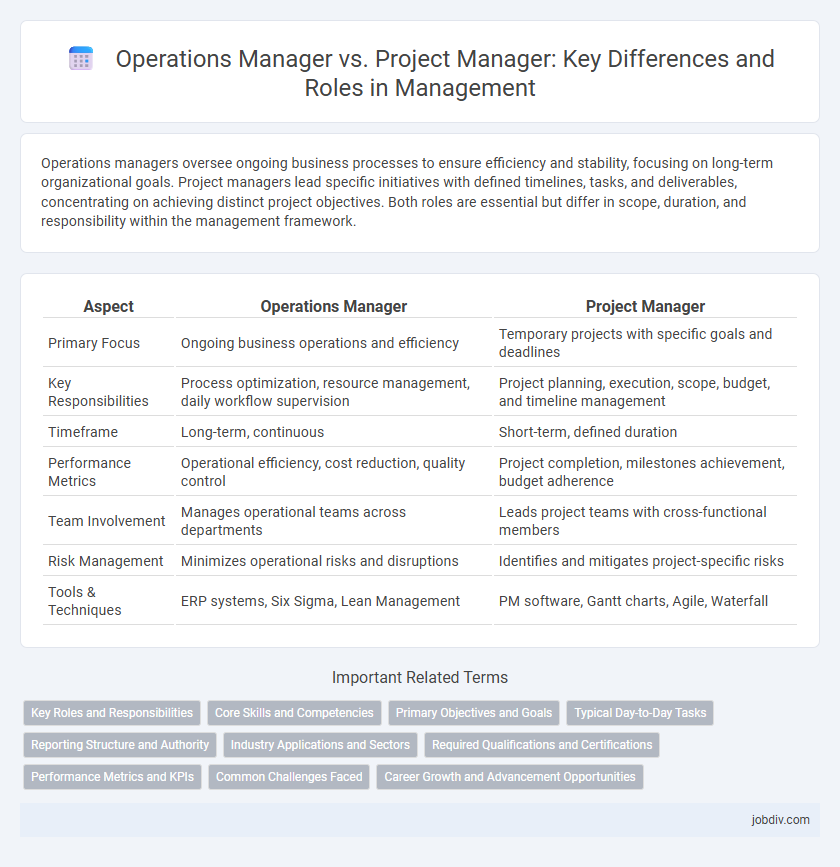Operations managers oversee ongoing business processes to ensure efficiency and stability, focusing on long-term organizational goals. Project managers lead specific initiatives with defined timelines, tasks, and deliverables, concentrating on achieving distinct project objectives. Both roles are essential but differ in scope, duration, and responsibility within the management framework.
Table of Comparison
| Aspect | Operations Manager | Project Manager |
|---|---|---|
| Primary Focus | Ongoing business operations and efficiency | Temporary projects with specific goals and deadlines |
| Key Responsibilities | Process optimization, resource management, daily workflow supervision | Project planning, execution, scope, budget, and timeline management |
| Timeframe | Long-term, continuous | Short-term, defined duration |
| Performance Metrics | Operational efficiency, cost reduction, quality control | Project completion, milestones achievement, budget adherence |
| Team Involvement | Manages operational teams across departments | Leads project teams with cross-functional members |
| Risk Management | Minimizes operational risks and disruptions | Identifies and mitigates project-specific risks |
| Tools & Techniques | ERP systems, Six Sigma, Lean Management | PM software, Gantt charts, Agile, Waterfall |
Key Roles and Responsibilities
Operations Managers oversee daily organizational processes to ensure efficiency, manage resources, and maintain quality control. Project Managers focus on planning, executing, and closing projects within scope, time, and budget constraints while coordinating cross-functional teams. Both roles require leadership and communication skills but differ in their scope, with Operations Managers handling ongoing activities and Project Managers managing temporary initiatives.
Core Skills and Competencies
Operations Managers excel in process optimization, resource allocation, and maintaining day-to-day business functions to ensure seamless operational efficiency. Project Managers demonstrate expertise in project planning, risk management, and cross-functional team leadership, driving projects to successful completion within scope, time, and budget constraints. Both roles require strong communication, problem-solving abilities, and leadership skills, but Operations Managers prioritize long-term operational stability, while Project Managers focus on achieving specific project goals.
Primary Objectives and Goals
Operations Managers concentrate on optimizing ongoing processes, ensuring efficient resource allocation and maintaining consistent production quality to support long-term organizational stability. Project Managers focus on achieving specific project goals within set timelines, budget constraints, and defined scopes to deliver unique outputs or outcomes. The core objective of Operations Management is sustaining and improving business operations, while Project Management aims at temporary, goal-oriented initiatives with clear start and end points.
Typical Day-to-Day Tasks
Operations Managers oversee ongoing business processes to ensure efficiency, including managing supply chains, coordinating teams, and optimizing workflow. Project Managers focus on planning, executing, and closing specific projects by defining goals, allocating resources, monitoring progress, and managing stakeholder communication. Both roles require strong leadership and organizational skills, but Operations Managers emphasize continuous improvement while Project Managers concentrate on temporary, goal-oriented initiatives.
Reporting Structure and Authority
Operations Managers typically report to senior executives such as the COO or General Manager, overseeing ongoing business functions with broad authority over departments and resources. Project Managers generally report to a PMO director or a senior project leader, holding defined authority limited to specific projects with temporary scopes and budgets. The distinction in reporting structure reflects their varied roles: Operations Managers maintain continuous operational control, while Project Managers exercise focused governance tied to project milestones and objectives.
Industry Applications and Sectors
Operations Managers primarily drive efficiency and continuity in manufacturing, logistics, and service industries by optimizing daily workflows, supply chains, and resource allocation. Project Managers excel in sectors like construction, IT, and healthcare by overseeing temporary, goal-specific initiatives, ensuring timely completion, budget adherence, and stakeholder coordination. Both roles are critical in technology, finance, and retail industries where operations demand both persistent process management and dynamic project execution.
Required Qualifications and Certifications
Operations Managers typically require a bachelor's degree in business administration, management, or a related field, with preferred certifications including Certified Manager (CM) or Six Sigma Green Belt to optimize process efficiency. Project Managers often hold a degree in project management, engineering, or business, complemented by certifications such as Project Management Professional (PMP) or PRINCE2 to ensure expertise in planning, executing, and closing projects. Both roles benefit from strong leadership skills and experience, but certifications like PMP are more specialized for project management, while Six Sigma focuses on continuous operational improvement.
Performance Metrics and KPIs
Operations Managers prioritize KPIs such as production efficiency, cost control, and quality assurance to ensure ongoing business processes run smoothly and meet organizational goals. Project Managers focus on performance metrics like project completion time, budget adherence, and scope fulfillment, ensuring projects are delivered on schedule and within allocated resources. Both roles utilize data-driven insights, but Operations Managers emphasize continuous process optimization while Project Managers target milestone achievement and deliverable quality.
Common Challenges Faced
Operations Managers and Project Managers both encounter challenges related to resource allocation and time management, often balancing multiple priorities and deadlines simultaneously. Ensuring clear communication across diverse teams and managing stakeholder expectations frequently complicate workflows in both roles. Conflict resolution and adapting to changing organizational goals also pose significant challenges, requiring strong leadership and decision-making skills.
Career Growth and Advancement Opportunities
Operations Managers typically experience steady career growth through expanding responsibilities in process optimization and team leadership within established business functions. Project Managers often advance by developing expertise in cross-functional project delivery, earning certifications like PMP to access senior roles in project portfolio management. Both roles offer distinct pathways, with Operations Managers leaning towards strategic management and Project Managers focusing on specialized project leadership roles for career advancement.
Operations Manager vs Project Manager Infographic

 jobdiv.com
jobdiv.com